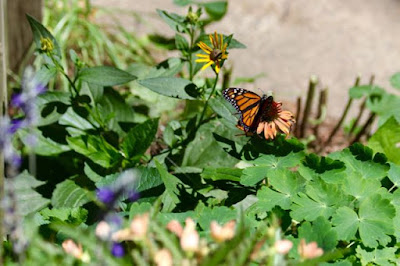 |
| Spring will eventually get here. Will it be silent?
Photo by J. Harrington
|
I mention these facts because our extended spell of damp, dreary, depressing weather has me grasping for any straw that may contain optimism: Spring, mud, ephemerals, flowing waters, sunshine? All of this brought to mind the following paragraph from Rachel Carson's Silent Spring.
"Then, one spring, a strange blight crept over the area, and everything began to change. Some evil spell had settled on the community; mysterious maladies swept the flocks of chickens, and the cattle and sheep sickened and died. Everywhere was the shadow of death. The farmers told of much illness among their families. In the town, the doctors were becoming more and more puzzled by new kinds of sickness that had appeared among their patients. There had been several sudden and unexplained deaths, not only among the adults but also among the children, who would be stricken while they were at play, and would die within a few hours. And there was a strange stillness. The birds, for example—where had they gone? Many people, baffled and disturbed, spoke of them. The feeding stations in the back yards were deserted. The few birds to be seen anywhere were moribund; they trembled violently and could not fly. It was a spring without voices. In the mornings, which had once throbbed with the dawn chorus of robins, catbirds, doves, jays, and wrens, and scores of other bird voices, there was now no sound; only silence lay over the fields and woods and marshes. On the farms, the hens brooded but no chicks hatched. The farmers complained that they were unable to raise any pigs; the litters were small, and the young survived only a few days. The apple trees were coming into bloom, but no bees droned among the blossoms, so there was no pollination and there would be no fruit. The roadsides were lined with brown and withered vegetation, and were silent, too, deserted by all living things. Even the streams were lifeless. Anglers no longer visited them, for all the fish had died. In the gutters under the eaves, and between the shingles of the roofs, a few patches of white granular powder could be seen; some weeks earlier this powder had been dropped, like snow, upon the roofs and the lawns, the fields and the streams. No witchcraft, no enemy action had snuffed out life in this stricken world. The people had done it themselves."The chemical industry vilified her, or at least tried to. She was correct. Despite the industry's concerns, the sky has not fallen, collapsing the American economy. Now we have a new administration and the fossil fuel industries making claims about climate change similar to those the chemical industry made about Ms. Carson. The scientists are again correct and our new government is incorrect.
Carson, however, offers us even more telling guidance for these issues we face in this Winter of Our Discontent. More than fifty years ago she brought to our attention our misplaced priorities, values and practices:
"Additionally Silent Spring suggested a needed change in how democracies and liberal societies operated so that individuals and groups could question what their governments allowed others to put into the environment. Far from calling for sweeping changes in government policy, Carson believed the federal government was part of the problem. She admonished her readers and audiences to ask “Who Speaks, And Why?” and therein to set the seeds of social revolution. She identified human hubris and financial self-interest as the crux of the problem and asked if we could master ourselves and our appetites to live as though we humans are an equal part of the earth’s systems and not the master of them."As near as I can tell, we haven't fully addressed the environmental issues Carson warned us about, and we're even more remiss in attending to the health of our democracy. In an age when our federal government wants us to accept "alternate facts," it's way past time to settle down between now and Spring 2017 and read (or reread) Silent Spring. Then we must organize to act on the social revolution we need, just as we did for the first Earth Day and the enactments of the Clean Air and Water Acts, the Endangered Species Act. We did it once. It's time to do it again before we find ourselves living(?) in Carson's imagined community.
UPDATE: [don't forget to check your local PBS listings for Rachel Carson, the movie]
Silence
By Billy Collins
There is the sudden silence of the crowdabove a player not moving on the field,and the silence of the orchid.The silence of the falling vasebefore it strikes the floor,the silence of the belt when it is not striking the child.The stillness of the cup and the water in it,the silence of the moonand the quiet of the day far from the roar of the sun.The silence when I hold you to my chest,the silence of the window above us,and the silence when you rise and turn away.And there is the silence of this morningwhich I have broken with my pen,a silence that had piled up all nightlike snow falling in the darkness of the house—the silence before I wrote a wordand the poorer silence now.
********************************************
Thanks for visiting. Come again when you can.
Please be kind to each other while you can.
No comments:
Post a Comment